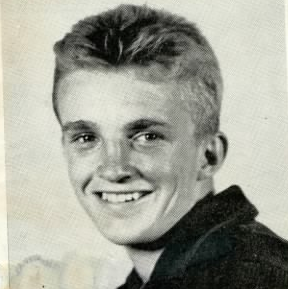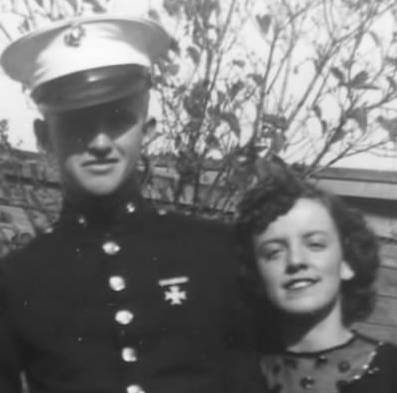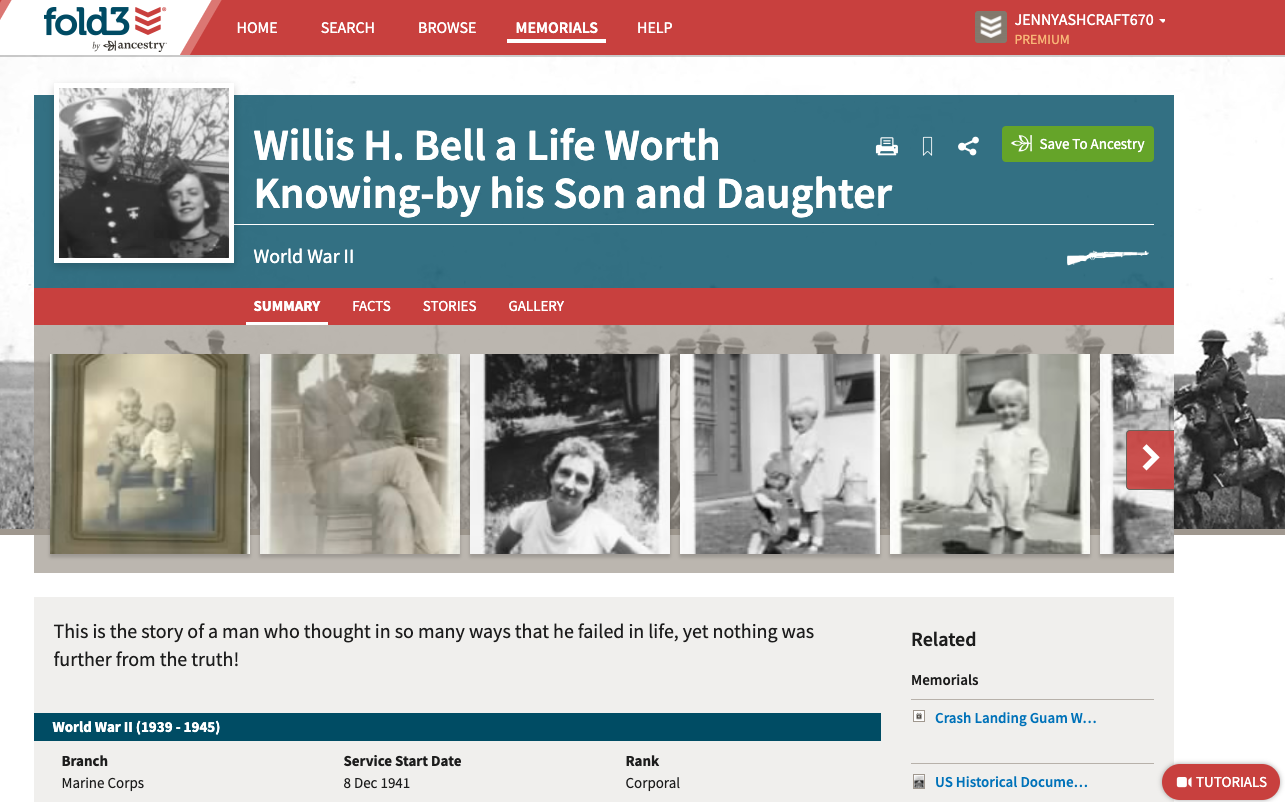Have you ever visited the Fold3 Honor Wall? The Honor Wall is comprised of thousands of Memorials created by our users to pay tribute to America’s veterans. Memorials can contain memories, diaries, stories, photos, and more! They are a wonderful way to share, collaborate, and even learn things about your loved one’s service based upon the histories contributed by others. These pages are a great way to keep our veterans’ stories alive.
For example, the children of Willis H. Bell created this Memorial in his honor. Bell enlisted in the Marine Corps the day after Pearl Harbor was bombed when he was just 17-years-old. He was stationed aboard the USS Chicago when the ship was hit with torpedoes during the Battle of Rennell Island. Bell remembered, “When the first torpedo hit the ship, I was blown through an open hatch down to the next deck, which really did a number on my back. In a later explosion that same night I sustained flash burns about the ankles.” The USS Chicago sank, and Bell ended up in the water for two hours before being rescued. The Navy dropped depth charges to keep the sharks away. Bell received treatment for his injuries though it took about a month before he could stand up straight.

After being released, Bell volunteered for the Raider Battalion 6th Marine Division where he landed at Bougainville in the Solomon Islands. While on Bougainville, Bell was plagued by jungle rot. Jungle rot was a tropical disease that occurred when skin lesions caused by microbes became infected and ulcerated. The painful disease eroded muscles and tendons, and sometimes even bone. Bell’s treatment consisted of putting his legs in a metal basin of water with an electrical current flowing through to clean out the ulcerated sores. Bell remembered that he and other soldiers would have contests to squeeze the sores and see who could hit the top of the tent first. He remembers being able to see right down to the bone in his wounds. Bell also contracted Dengue Fever on the islands.
Several months later, Bell’s regiment came ashore at Guam. One night while hunkered down after dark, Bell heard movement. The regiment followed a hard and fast rule that nobody was allowed above ground after dark without letting fellow soldiers know. Bell had not received word that anyone would be out, so when he sensed movement, he fired. Horrified, Bell learned that he shot and killed his squadron leader. Within 24 hours Bell also lost two more good friends and a third received serious wounds. Devastated both mentally and physically, Bell continued fighting until he came down with a severe case of cerebral malaria. He was so ill that he was found raving incomprehensibly and shipped to a hospital in San Diego. He eventually recovered, but his wartime maladies bothered him throughout his life.

Bell’s family recalls that later in life, Bell did not consider his life a success. Sometimes he displayed irrational anger but understanding his story helped Bell’s family to overlook his weaknesses and imperfections. To them, their father is a hero!
Do you or your loved ones have military stories, photos or diaries? Creating a Memorial is easy to do! Follow the instructions in this video tutorial. Be sure to include regiment, unit, or battalion and as many searchable details as you can. Don’t forget to search other existing Memorial pages and you may learn more about the service of your veteran! Visit Fold3 and get started today!

So sad that this man’s life was ruined by his time serving his country. On a happier note, I know a 94 year old man in LA who was a Marine in the first wave attacking the Japanese-held islands of Guadalcanal, Tarawa, Saipan and Tinian. He killed many Japanese soldiers, but never received a scratch. Later, after he graduated from college, he volunteered to fly jets in the Korean War, and then became a civilian jet pilot. Along the way, he got a Ph.D. He wrote a book about his experiences, entitled “Open Fire!”, by Roy Roush.
A marvelous tribute to a great Marine and father who apparently did things as wonderful as life itself. He will undoubtedly receive the most precious reward at the gates of Heaven. The one presented by you family members has been a joy to read in spite of the unfortunate circumstances of his life after ‘service’. Thank you and know that he is thanked for his service.
Thank you for your service.
We never did enough for our veterans.
My heart breaks most for the Vietnam War fellows. Those fellows draft dodging hippies spat on. That is a huge group that a massive percentage committed suicide after returning, and most who got past that have died of various cancers. Connected to Agent Orange defoliant. In or before their very early 70’s. Homelessness. Joblessness. Psychological problems that ceased their lives being as they should have been. My heart has been broken over not doing as much as I feel I could have for victims of many things, but as much as any for veterans.
The treatment the Vietnam Veterans received when they returned home was deplorable. Our return flight was redirected twice to avoid the dope-smoking flower child reception committee. Subsequent illnesses and wounds caused many deaths. What suffered most was our “broken hearts”. A common comment among the vets I know when a half-assed attempt is made to make nice goes thus… “Too Fu__ing little, too fu__ing late”.
We didn’t all treat returning Veterans like that, Douglass, keep that in mind.
My mother’s cousin served in the Pacific. When wounded he was declared KIA by the medics and placed into the “dead pile”. A medic happened to hear moans and discovered that mother’s cousin was still alive. He was moved and treated. He lived a happy farmer’s life until he was in his mid eighties.
He always said that the reason he lived was because of his love for his girlfriend and future wife who also happened to a cousin of my mother on the other side of the family.
What a great story!
My uncle was among the Americans who liberated the Philippines from the Japanese. When they waded ashore a grateful Filipino woman gave my uncle the gift of an egg. He loved to tell that story. He also survived the war after hand to hand combat and foxholes on the island of Corregidor. He was gone for 4 years.
Such bravery at age 17, inconceivable compared to a lot of the youth today.
God bless this man and his family! A true American Hero and Patriot!
This man went through so much, at such an early age, and it marked the rest of his life. I’m so grateful for him, and for all the men and woman of that generation.
My father served in the U.S. Navy, in the Pacific, during WWII. He spent most of his time on a minesweeper, and thankfully suffered no injuries. My biggest regret is that I never talked to him about it. I was 19 when we lost him, and at my immature age it never occurred to me to ask him about his experiences. He probably would have been happy to share.
I’m so proud of him!
Dear Louise, My personal direct experience with my father who served in the Pacific theatre during WW2 would suggest that your father would not be likely to tell you much. The things that these men experienced, saw, and had to do, were unspeakable. A lump would form in my fathers throat, and he would not speak of the war except for very brief statements. Then done. He served on the USS Gunston Hall (LSD-5) which fought thrugh the Marshall, Solomons, Carolines and Okinawa-Gunto. The LSD’s were used to put the Marines ashore, running LST’s, Higgins Boats, etc. and the swabbies often had to stick it out on the beach with the Marines. The sun sets quickly in the Pacific and under wartime blackout conditions, the men would not have been able to find the ships in the dark. Also, the men would cast off the beach and go out about a mile and wait for sunrise. The Japanese would come out at night, swim out to the boats and attack them, so they had to keep constant vigil. Those men went up against the most vicious tactics and behaviors that the Japanese could mete out. My father returned home afflicted with what we know now as PTSD, from the war. In those days, PTSD was not a recognized condition, it was called something else. The men recovered sufficiently to “appear” to be OK, but deep down, they never recover. Never. And even the families suffer from the condition. My father remained in the Navy after the war and was tasked to Operation Crossroads, where he witnessed Able and Baker atomic bomb tests. The men were exposed to gamma radiation, and then radionuclides from the fall out– alpha and beta emitters. My father became ill with radiation sickness, lost al of his hair and ended up on the hospital in San Francisco for something like 9 months. He lived to be only 56 and succumed to radiation sickness. Cancer racked thorough his entire body from radiation exposure. I once asked him– Dad, why didn’t you guys protect ourselves from the effects of the bomb. And he said — Son, we didn’t know anything about nuclear physics back then. We didn’t know. But let me tell you this — IF I HAD TO, I WOULD DO IT AGAIN. Never wonder ever again why they are called “THE GREATEST GENERATION”!
My father was a minister who served as an assistant pastor at a large DC church in 47-48, moved to the Shenandoah Valley for 5 years, and then returned to Arlington to serve a new parish. I am not sure whether it was during the first or second time, but he visited patiients at a VA Hospital where he saw a patient who haunted him and would show up in a sermone nearly every year. The patient was a young officer whose tank was hit by a German shell. The explosion threw him out of the turret and he landed, stunned but uninjured beside his tank; there, he had to listen t the screams of his crew burning in the tank.
The nurses said he was stuck in that moment and was still hearing them. Nothing they could do had been able to break him free f that moment
When I served, I was far more concerned by a situation such as that than of being killed. The brain is who we are.
God Bless Willis H. Bell and all the other brave men and women who have served our country since its inception. A special blessing to all those veterans who made the ultimate sacrifice or who returned home and lived a life in spite being scarred by the inhumanity and horror of war.
We owe each and every one a debt of gratitude every single day for this great country.
Could you help me think of the questions I should ask my Father? He is 92 and served in WWII in the navy. He was in the Pacific.
I contacted the WW II Museum in New Orleans and they were happy to send a professional interviewer to interview my uncle, now 98, about being on PT Boats in the South Pacific in WW II. We got a copy of the interview back after they posted it. You could do the same.
I see someone else has given you some good suggestions. If you are on Ancestry, you may be able to get muster rolls that will show ships he was on and dates and places. I googled the ship my dad was on and found a log that had a lot of information. He may have pictures of his ship and him with some of his friends. You could search for all of them on Fold3. Any of these things could refresh his memory and give you ideas of what to ask to get more information. Was he in a typhoon? Where was he when the Japanese surrendered? Where was he when Hiroshima / Nagasaki were bombed? How did he hear about it. What were some of the specific things he did?
If anyone knows anything about Charles W. Self served in WWII pacific asiatic theater LST 68. Western New Guinea, Luzon and Leyte. 556-446 sea.lc. USCGR under Hempstead and raphaelian he was awarded several bronze stars and a Purple Heart for wounded in action but unknown and other awards. However he never spoke of it except to my uncle that was in Vietnam. He said ship was hit split in 2 by a torpedo or bomber. Please if anyone knows anything I have searched high and low for info. Thanks so much and yes our vets are no where near taken care of as they should be very sad!
Can you provide year/month of birth, state, name of spouse, year of death?
My father served in the Pacific during WW2, also. Before he passed away in 2007, I videotaped him telling his stories for his family. There are more than 100 short videos of him talking at:
https://www.youtube.com/Gingeronymous
What worked best was making him comfortable in his easy chair and letting him tell whatever stories he wanted to tell, while I listened and showed interest, and the camera rolled nearby (forgotten after awhile).
Gloria:
You could find out his rank, specialty, term of service/enlistment, name of ship(s) served on or port/base assigned to, what battles he may have been involved in or witnessed, what he remembers about his friends and their names (helps others who may be researching their relatives), what incident or action was he most proud of, etc., etc., to name just a few
P.S. Don’t be surprised if it starts out slow – many veterans buried stuff deep, especially the painful stuff. Also, memories often come back by association with other things he may remember.
Hope it helps
Thank God for Willis H. Bell and his bravery! It was soldiers like Bell that saved our country from the evils that tried to take us over. Today we face these same evils but God is good and He will protect us. My husband, Paul, was a Gunnery Sergeant with the 8th Air Force Army Air Corp stationed in England. Yes! This generation was the best God created.
Someone mentioned bravery. They are 110% correct, Willis Bell was brave, but add to that guts, stamina, sense of duty, determination, and will. Thank you to him, and his millions of brothers-in-arms, or your service.
Thanks so much to the children of Willis H Bell united States Marine for sharing their father’s WWII experience. I agree with them that he is a true Red White and Blue American Hero.
Sadly my grandfather Merchant Marine Eduardo Aviles lost his life on February 22nd 1942, when his ship The Norlavore sank possibly torpedoed and sunk by U-432.
Our family received a letter in 1949 from president Truman honoring him for his service.
His son Edward Aviles joined the United States Army in 1942, and served as a cook in Japan. He survived until 2004.
Great story. Thank you for sharing that! My grandfather was also on the USS Chicago when it was sunk. He received a bronze star for helping to save people from the fires as the ship went down. So wonderful to hear another story from the Chicago!
anyone knows anything about Charles W. Self served in WWII pacific asiatic theater LST 68. Western New Guinea, Luzon and Leyte. 556-446 sea.lc. USCGR under Hempstead and raphaelian he was awarded several bronze stars and a Purple Heart for wounded in action but unknown and other awards. However he never spoke of it except to my uncle that was in Vietnam. He said ship was hit split in 2 by a torpedo or bomber. Please if anyone knows anything I have searched high and low for info. Thanks so much and yes our vets are no where near taken care of as they should be very sad!
Dee,
I’ve attached a link to some info on LST 68 with some photos. She survived the war, so obviously Charles W. Self was on another ship that sank. I suggest contacting the National Records Center in St. Louis to try and get any records they may have on him. https://www.navsource.org/archives/10/16/160068.htm